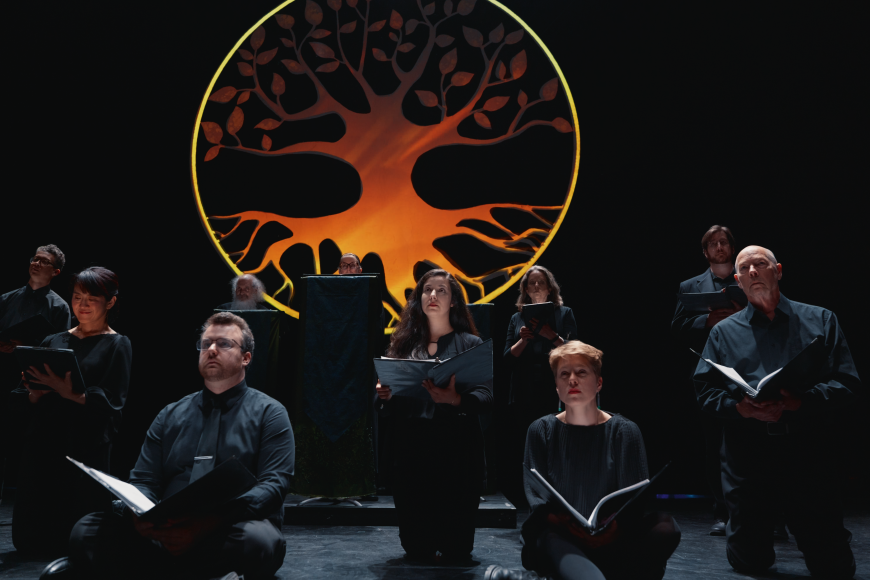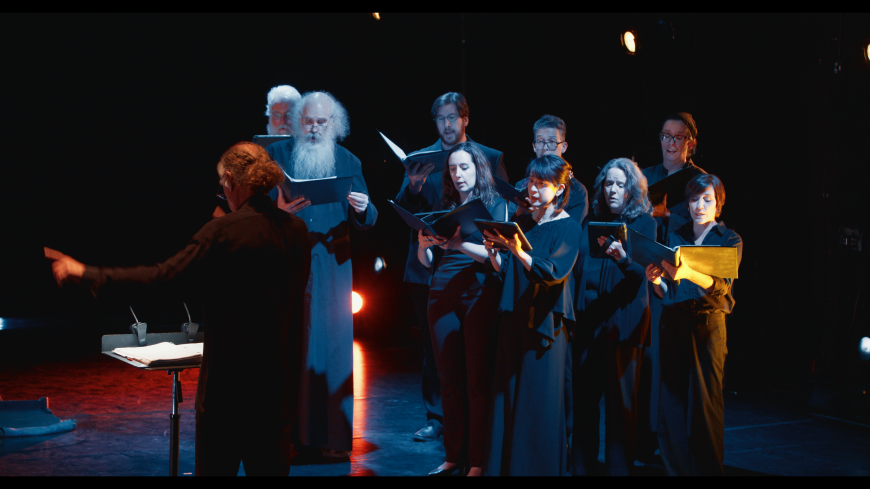
When environmental awareness is being perniciously purged from government funding, let’s applaud Volti for programming the issue into its performances at Z Space this past weekend.
In her printed notes for Ochre, which Volti premiered in 2022, Pulitzer Prize-winning New York City-based composer Caroline Shaw described her creation as a “contemplation of the Earth ... and appreciation for the beauty of soil, color, ochre.” On Friday, June 6, the rear wall of Z Space glowed with Heidi Gustafson’s Pacific Northwest photographs of the mineral’s pigments, which accompanied the 16 Volti singers in each of the piece’s seven movements.

The choir was arrayed in an arc across the stage area, with conductor and Artistic Director Robert Geary at center and percussionist Ward Spangler offstage right. Both of the evening’s compositions included sections without text, as well as passages of musicalized poetry — in Shaw’s piece drawn from Johann Wolfgang von Goethe, Alfred Lord Tennyson, and Josquin des Prez. Both of the works also contended with the challenge of an absence of supertitles and the lack of any advisory to the audience, either through signage or in Geary’s spoken introduction, that a thorough perusal of the text of the program booklets was a prerequisite to both understanding of the composers’ thematic missions and verbatim appreciation of the poetry used to tell the tales.
Ochre’s initial movements brought clouds of harmony that floated and sometimes conjoined, along with melismatic glissandos. Sighs and murmurs were deployed with affecting results. But it was at times hard to distinguish passages in English from vocalese. Spangler provided spare accompaniment and soft pulses on muted bass drum for a movement called “Maghemite,” with the women singers repeating a tone and then diverging in close intervals evocative of the diaphonic harmonies of the Bulgarian women’s choir Le Mystère des Voix Bulgares. Pleasant incantatory voicings in the tenors were passed on to the basses. “Magnetite” was another movement without text; the women instead sounded innovative, airy exhalations.
“Vivianite” was one of the few movements in which the volume of the choir approached forte, though there was also humming. The culminating movement, titled “Goethite” after the mineral that bears the poet’s name, was accompanied by an image of an inscribed stone. The pairing proved more interesting than the five-line quote from Goethe, which the choir sang over sweet, simple melodic lines played on a vibraphone with four mallets, followed by gentle, breathy exclamations. In places Shaw’s minimalistic musical approach was evocative of Philip Glass’s environmental soundtracks to Godfrey Reggio’s films, but without Glass’s driving force and momentum.
The Guardians of Yggdrasil, following intermission, was a world premiere by Volti composer-in-residence Mark Winges, with a libretto by poet and soprano Lisa Delan, both based in San Francisco. The title of the piece names a tree sacred and central to ancient Norse mythology, from which all life extends, with its guardians in the past, present, and future represented onstage by the choristers.

Unlike the relatively static presentation of Ochre, Yggdrasil deployed theatrically effective movement of all choristers in varying groupings, staged by former Volti Executive Director Barbara Heroux. This helped further the quasi-operatic story about the guardians’ struggle to stay true to their allegiance to the tree, as voiced in Delan’s verse. The staging also inspired the singer-actors, enhancing both their emotional involvement and that of the audience.
Winges’s prerecorded electronic accompaniment, with some recorded vocals, at times suggested a transcendent organ. It was keyed in by the composer from a console offstage right. The music explored complex harmonization and varieties of solo and small-group vocalization, putting the singers’ virtuosity on full display.
Absent visible text, Delan’s libretto, well suited to the tale, was more discernible in certain portions of the piece, as in the third movement when the guardians are tempted toward “more, more, more!” of the material world. A widely published poet inclined toward lyrical prosody, Delan offers words that are worth reading on their own. But she and Winges were well matched in a spiritual quest, evocative of Benjamin Britten’s church parables. Here, it culminates in Yggdrasil’s final movement, with the singers’ full-throated appeal of “What would you do? What would you give?” followed by a unison resolution — “as our trembling hands together hold the world.”




